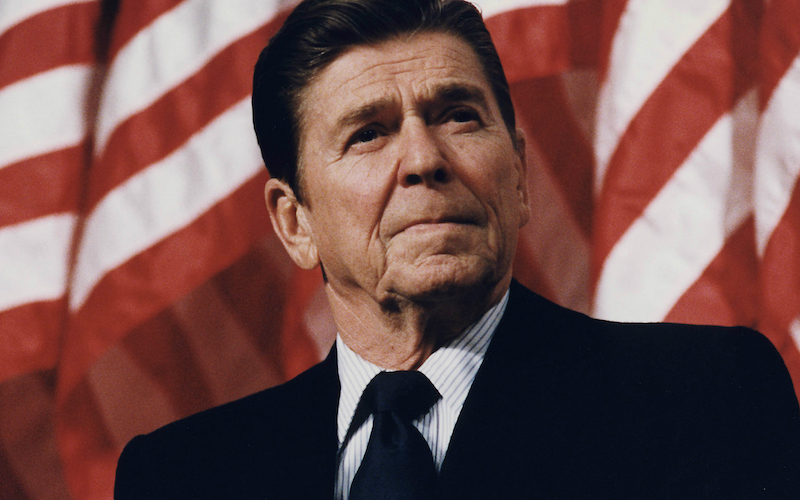
Putin’s Rollback: Walking in Reagan’s Footstep
Ronald Reagan, the 40th US president is widely credited as the man who ended the Cold War. Reagan replaced Nixon era détente with the policy of roll back in respect to the Soviet Union. The transition from détente to roll-back was a major paradigm shift in the American mindset. The policy of détente or relaxation was characterized by the mutual respect of borders, arms control and peaceful coexistence between two global powers.
Previous American administrations prior to Reagan’s were careful in dealing with the Soviet Union and were especially reluctant to confront the Soviet backed Marxist revolutionaries in the third world. The Reagan administration didn’t only rely on rhetoric but effectively revised American policy towards the USSR by stepping up military and political support to anti-communist forces around the globe from Nicaragua to Afghanistan. His administration escalated the military buildup which ultimately brought about the dissolution of the communist superpower.
Now after more than two decades after the fall of the USSR, someone else is following in Reagan’s footsteps. However, this time it is not an American but the Russian president, Vladimir Putin. Following the resurgence of tension between Russia and West after the annexation of Crimean Peninsula, the Russian strong man is hell bent on confronting the United States everywhere including within the US itself.
Of course it would be unrealistic to suggest that a Russian “Roll-back” could effectively dethrone the United States from being the only global superpower because Russia is neither an economic giant nor a military juggernaut but it can offset American influence to a significant extent in strategically important regions like Central Asia, Europe and the Middle East.
To pursue that objective, the Kremlin has adopted a strategy of ‘indirect confrontation’ by combining a wide range of tactics such as diplomacy, hacking, election manipulating, propaganda, military intervention and other strategies. Keeping the volatile political situation in mind, Moscow has aligned itself with the European ‘far-right’ and euro skeptic parties. Putin has emerged as a ‘Messiah’ for many far-right leaders in Europe. For example, Marine Le Pen, the leader of French National Front has dubbed him as the defender of “European values” while Nigel Farage called him a “brilliant strategist.” The alliance between Moscow and the European far right is further strengthened by their shared opposition to the European Union which they view as an entity “subservient to American interests.” Russia is keen to take full advantage of the current upheavals due to the refugee crisis in Europe to make sure that a ‘divided’ Europe fails to stand up collectively to its renewed ambitions.
In the Middle East, a region traditionally viewed as within the American sphere of influence, Russia is making a strong comeback. Since the fall of the USSR, Russia had been playing a minimal role in the region but the Syrian civil war and the rise of ISIS gave Moscow the incentive to become involved in the regional politics more aggressively. In Syria, Russia has reduced Washington to an observer from that of an active player. Russian military intervention in Syria saved the Assad regime.
Moscow even successfully brokered a ceasefire between the regime and the rebels by bringing Iran and Turkey into negotiation talks which did not include the US. Russia’s committed defense of the Assad regime is likely to bring many states into its fold who might see Moscow as a more credible and reliable ally than Washington. Afghanistan is likely to become another geo-political battleground between Moscow and Washington. Russia has recently invited Pakistan and China into trilateral talks regarding the future of Afghanistan and has established contacts with the Taliban which it views as a counterweight against the Islamic State militant group. Russia’s recent diplomatic moves indicate that Moscow is keen to portray itself as a viable alternative to the United States.
While Vladimir Putin continues to outsmart American leadership in the international arena, the Russian hacking scandal has become a heated issue in American domestic politics. Contrary to the assertion made by the US intelligence community, president-elect Donald Trump insisted that the Russian hacking of Democratic national convention didn’t affect the presidential election and vowed to normalize ties with Russia during his presidency. Only time will tell whether Trump can bring about ‘détente’ with Russia but it is obvious that Moscow wants to exploit the existing political polarization in American society to divide it further.
It is likely that Russia will continue to outplay the United States in the international arena in the coming years because the new administration has no coherent policy goals with which to engage Moscow. The current Russian geopolitical adventures are in no way isolated incidents but part of a grand design to form a Eurasian bloc to counter balance the unipolar world order dominated by what Aleksandr Dugin calls the Anglo-Saxon Atlantic Axis led by the United States. Donald Trump’s isolationist and anti-globalist world view will further bolster the Russian agenda by disengaging the United States from its allies. The ultimate success of the Russian “rollback” depends on the determination of Vladimir Putin and the indifference of Donald Trump.
